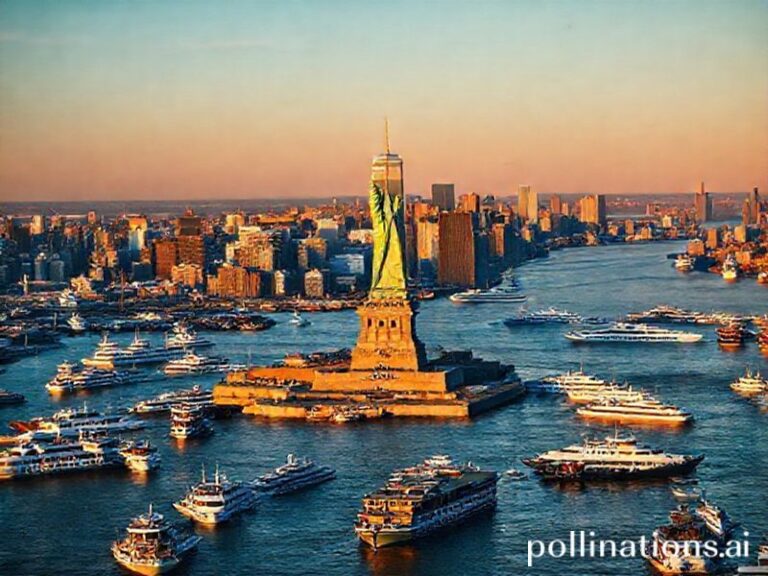Global Time Zones Collide: Inside the Ryder Cup Schedule That Briefly Unites a Fractured World
The Ryder Cup Schedule: A Fortnight When the Planet’s Problems Are Quietly Relegated to Noise-Cancel Mode
by Our Sardonically Jet-Lagged Correspondent, somewhere between Marco Simone and existential dread
Rome, late September. While the rest of humanity toggles between wildfires, currency meltdowns, and the latest geopolitical TikTok, a discreet corner of the Eternal City has been cordoned off for an even older clash of civilizations: Europe versus the United States, fought not with tariffs or Twitter, but with graphite shafts and the faint smell of artisanal sunscreen. The Ryder Cup schedule—formally announced months ago yet obsessively re-checked by insomniac fans in Singapore basements—kicks off Friday at 7:35 a.m. local time, which is 1:35 a.m. in California, where the only people awake are software engineers rage-tweeting about their vesting cliffs and insomniac gamblers in Manila who have bet the GDP of Tuvalu on Viktor Hovland’s fourball record.
Global markets, ever sentimental, have already priced in a 0.3 percent uptick in European consumer confidence solely on the rumor that Rory McIlroy smiled during practice. Meanwhile, the U.S. Treasury’s algorithmic overlords have flagged “Ryder Cup outcome” as a leading indicator for S&P volatility, because nothing says rational allocation of capital like basing bond yields on whether Jordan Spieth holes a 30-footer.
Time Zones, Existential and Otherwise
For viewers in Seoul, the opening tee shot lands right after lunch; in São Paulo, just after the daily currency devaluation; in Lagos, conveniently before the generator runs out of diesel. The International Date Line, usually a sober cartographic fact, becomes a cosmic punch line: by the time the Pacific catches up, the match may already be mathematically over, or suspended because the Roman skies have decided to deliver a Mediterranean monsoon—climate change auditioning for a cameo.
Corporate sponsors have thoughtfully provided a downloadable “global sleep-loss calculator,” which helpfully informs a Tokyo salaryman that he will be 12 percent less productive on Monday, assuming he stays up until 3 a.m. to watch foursomes. HR departments across the planet have quietly classified Ryder Cup Monday as a “strategic sick-day corridor,” somewhere between mental health and mild alcohol poisoning.
Soft Power in Spiked Shoes
Diplomats insist the event is apolitical, which is adorable. The European team wears the EU flag’s midnight blue, while the Americans sport a shade of red that Pantone officially calls “Cholesterol Alert.” Both sides will pose for handshakes that look cordial until you zoom in and notice the micro-expressions of men calculating exactly how many FedEx Cup points each handshake is worth.
Viewed from Beijing, the Ryder Cup is a fascinating case study in “non-militarized alliance behavior”—a phrase the foreign ministry uses when spies want to sound like grad students. From Moscow, it’s proof that the West will spend millions on grass maintenance while lecturing others about sanctions. From Canberra, it’s simply the only week of the year when rugby league bars reluctantly switch the big screen to golf, causing a brief but measurable dip in domestic violence statistics.
The Broader Significance (Because Someone Has to Pretend)
Economists who should know better have run regressions showing that the winning continent enjoys a 0.2 percent bump in inbound tourism the following year—statistically significant if you squint and exclude pandemics. Environmentalists note that a single Ryder Cup consumes enough water to float the Maldives until it inevitably sinks anyway. And psychologists, never invited to the party, point out that the event provides a rare global safe space for grown men to cry in public without having to fake a hamstring injury.
Come Sunday’s singles, the planet will briefly synchronize its collective pulse. Trains in Mumbai will miss a beat, espresso machines in Naples will hiss in unison, and a trader in Zurich will instinctively short the dollar because Justin Thomas just shanked one into the cypress trees. Then the final putt will drop, the trophy will be hoisted, and the world will remember it still has bills, wars, and heatwaves to attend to. But until that moment, the Ryder Cup schedule is the closest thing we have to a universal pause button—proof that even in 2023, humanity will still set its alarm for 3 a.m. just to watch twelve strangers in polyester decide which side of the Atlantic gets bragging rights for the next 730 days.







